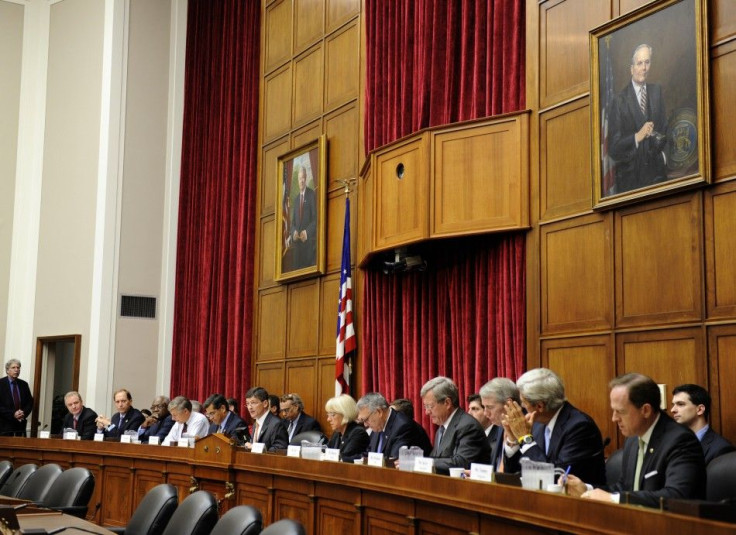Longing for Super Committee's Super Secret Days
ANALYSIS

Remember the good ol' days, when no one had a clue what the Congressional super committee was up to?
Life for the dozen Congress members charged with finding some sort of 10-year, $1.2 trillion budget deficit fix has become a veritable embarrassing La La Land of who said what, politicking, and mixed messages, to virtually no one's benefit.
Case in point: U.S. Sen. Chuck Schumer, D-N.Y., who on Monday went on Morning Joe and said, I don't think the Super Committee is going to succeed because our Republican colleagues have said, 'No net revenues.'
Hours later, Schumer flatly denied ever saying he doubted the super committee's ability, according to the Washington Post.
What I said was that it's very hard to see how anything is going to get done without net revenues, Schumer reportedly said. And so far, the other side isn't for net revenues.
Schumer's is the latest in a round of political posturing regarding the work of the super committee, which must offer up a plan by Nov. 23. A full Congressional vote on their proposal will follow a month later. Should they fail, automatic cuts will hurt both defense and entitlement programs.
To date, the progress of the six Republicans and six Democrats has been vague, simply because they've been so tight lipped about nearly everything. That hasn't stopped Capitol Hill's leadership from casting its imposing shadow over the proceedings. And leaks of failed plans have given the respective parties a fallback option, should the committee fail and blame need to be assigned.
Super Committee: Not Clandestine Enough?
One must ask if a committee that was once deemed too clandestine has now become a political device open to bullying by party leadership, and more importantly, if the American people will be the ultimate losers in this increasingly sad show?
Things became initially dicey when House and Senate leaders in both parties stepped in to mediate seemingly stalled talks. Whatever was said in the meeting remained largely away from the public record. But the gathering precluded a barrage of leaks from both parties, immediately followed by political posturing.
First came a leak of Democrats' $3 trillion proposal, which mixed entitlement cuts and tax increases, and was promptly killed. Republicans followed suit the next day, leaking their own ill-fated $2.2 trillion plan, which included $600 billion revenue increases.
The ensuing back and forth, between Congress members both prominent and middling, has left the sense that any sort of principled stand is up for grabs: what is, and isn't on the table seems to be guided by opportunism and 2012's election.
House Speaker John Boehner, R-Ohio, expressed hope that a compromise could be reached, saying, Nobody thought the committee's job will be easy, and it hasn't been. No one is surprised by that. But in the same speech, he alluded to the GOP's adamant refusal to even humor tax increases.
Common ground doesn't mean compromising on your principles, he said. Common ground means finding the places where your agenda overlaps with that of the other party.
Then rumors of a mini Gang of Six forming within the subcommittee emerged, only to quietly die out.
The GOP's initial $2.2 trillion dollar offer brought about an instant backlash from within, as 33 Senate Republicans of varying prominence circulated a letter stating they espouse comprehensive tax reform that lowers rates and promotes economic growth, with no net tax increase.
Progress Toward A Deal: Plodding, At Best
Progress has been stuttering at best, with reports of hope that a grand bargain can be reached mixed with other assertions that the committee may ask for an extension of its deadline, which were then promptly debunked on Monday. So what in the world is even going on?
A veteran of Schumer's stature and attention-getting nature weighing-in on anything will set the tone for his Democratic colleagues. The senator even alluded to the political jockeying around the super committee during his Morning Joe interview on MSNBC. After mentioning the Republican aversion to revenue increases, he added, The American people are beginning to sniff this. They're beginning to sniff that the other side is sort of dug-in and not compromising.
What they're beginning to sniff is a Congress preparing to avoid blame, should the super committee fail. Rest assured, should Thanksgiving come without any sort of plan ironed out, both parties will be quick to repeat, We tried, but the opposing party was unreasonable in its demands, as if it were some sort of mantra.
Perhaps if Schumer and his colleagues stepped back and stopped inserting their 2012 script into the discussion, a deal may be reached.
The days of clandestine super committee dealings seem utopian in comparison to this.
© Copyright IBTimes 2024. All rights reserved.





















